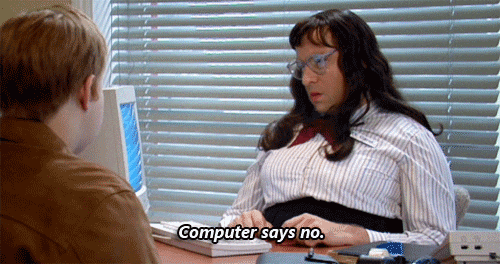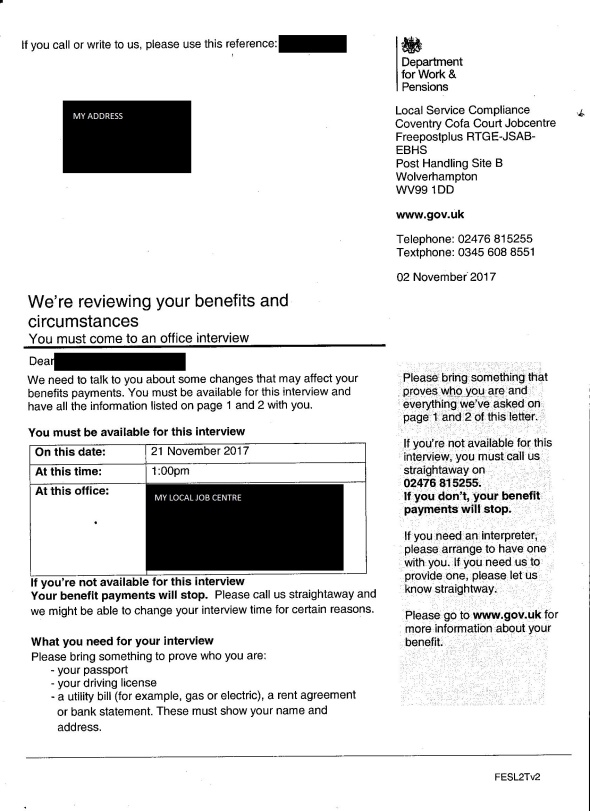I actually started this blog to show people how hard it is to claim disability benefits. But I’ve written very little about it. It’s largely too complex to know where to start. But today, a woman had a rant at me about benefits, so I’ll write here what I wish I’d said to her.
“As long as you’re not a freeloader. Some of these people have never worked a day in their life”
I’ve worked. I tried working full time, then I tried working part time. Nowhere will keep me, because I can’t reliably turn up and function because of my anxiety and fatigue. I still try and do bits of permitted work, and am talking to Remploy (an agency helping disabled people find work) to try and find something suitable for me with my disabilities.
I didn’t claim benefits initially – I lived off my savings. I then started claiming Personal Independence Payment in the hope it would help me to continue working. The idea of PIP (what used to be DLA) is that it covers the extra costs that living with a disability brings. I hoped it would pay for taxis when I couldn’t get to work by bus. I couldn’t keep that job, or the job I had afterwards, so I then succumbed and claimed Employment and Support Allowance, the equivalent of Jobseeker’s Allowance for people who are too ill or disabled to work.
So I have worked a day in my life, but some people literally can’t They’re severely disabled and not capable of any real work – such as someone with severe learning disabilities, who has a mind largely like toddler’s mind and thus doesn’t even understand what a job is. And some people have never managed to find appropriate work opportunities as they are so few and far between. More on that later,
There are always people who’ll take the piss. But there’s really no need to assume I’m one of them, particularly as you’ve only seen me three times in your whole life and we’ve hardly held a conversation.
“There’s plenty of jobs out there”
That doesn’t mean any of them will go to me.
There are many jobs out there that I look at longingly, and then realise I just wouldn’t be able to do. I do not have sufficient energy to do a full day’s work. It makes me feel pathetic to say that, but I’ve ended up falling asleep on the job or trying to discreetly nap in toilet cubicles just to get through the day. I can’t do anything that demands people skills because I’ve got Asperger’s Syndrome and when I get anxious, I cannot deal with other people. They terrify me.
There are also many jobs out there for all manner of things I’m not qualified for. It’s irrelevant how many job opportunities there are if they’re jobs that I can’t do. But y’know, maybe I should just go “There are plenty of jobs for electricians; I’ll just apply for one not knowing which way up a fuse goes!”
“I’ve got six things wrong with me and I still work”
I could go down the petty route and go “Well I’ve got thirteen things wrong with me” but that’d just show how stupid the point is. I can say there are thirteen things wrong with me because that includes haemorrhoids, and about four diagnoses that are usually summarised as “weakness and pain in legs”. So, not only can your ‘six things wrong’ include minor things that wouldn’t impair your ability to work, but the number is completely irrelevant. If you have one thing wrong with you, and that ‘one thing’ is a spinal lesion that means you’re paralysed from the neck down, it’s going to be hard to find a job.
Also, congratulations that you’ve found suitable work for your difficulties. I’m determined to believe there is a way for me to earn a living with the disabilities I have, but I haven’t found it yet. I didn’t grow up with all of these conditions, and I had to find out how some of them affect me in the workplace. I’m trying to find out what the best path is from here, but I can’t instantly find a suitable career and train for it and get myself employed. These things take time.
To be honest, I’m surprised you’ve found someone who will employ you. Many employers will chuck your application in the bin the minute they find out there’s anything ‘wrong’ with you. The law says they can’t, and they must make ‘reasonable adjustments’ but they can always say it was something else. They’ll claim it wasn’t my disability, they other applicant just seemed more confident or something. It’s very hard to enforce the law here, and the reality is no one wants to employ me because I’ll take far too much sick leave.
Jobs that are suitable for disabled people are probably in much higher demand than they can fill. Think how many people want to work part-time: not just because they might be disabled, but because they might have children or other people to look after, or they might be studying part time for a future in a better career. There will only be so many part-time jobs, not one for everybody who wants/needs one. That’s the harsh reality.
“People say they can walk when they can. Did you hear about that one in…? ”
Yes, they do. Do you know how many people falsely claim to be disabled to get benefits? About 0.5%. That’s all.
(Source: https://www.gov.uk/government/statistics/fraud-and-error-in-the-benefit-system-financial-year-201516-estimates , figure for fraudulent Disability Living Allowance claims. Note that the rate of fraud for Jobseeker’s Allowance is 2.9%)
Most people who are going to cheat the system simply lie about how much they earn, to pay less tax or get low-income benefits that they’re not entitled to, while doing sneaky cash-in-hand work. (http://www.cas.org.uk/features/myth-busting-real-figures-benefit-fraud) Why? Because it’s much, much easier than pretending to be disabled.
It’s actually really hard to claim disability benefit when you actually are disabled, let alone when you’re not. You get interrogated. There are huge forms you have to fill out, attaching loads of medical evidence, and getting your GP to write to them because they can’t be bothered to do their job and contact the GP yourself. They then send another professional to assess face to face. This professional will sit there trying to catch you out by trying to pressure you into moving in ways that are painful with your disability, so they can write down that you can eg, get out of a chair unassisted. They’ll order you to do it. They’ll also say things like “You’ve said you watch Coronation Street, that shows you can pay attention, therefore you can work”. Great! I’ll try putting that on my CV, shall I? “I can roughly follow what’s going on in a single TV soap, and that’s the limit of my mental capacity. Please employ me”
Once you’ve done that, they routinely refuse claims the first time they’re sent. This may sound paranoid, but it’s happened to everyone I know who’s applied for Personal Independence Payment (the ‘new’ Disability Living Allowance), no matter what their condition is.
Why do you seem to think I’m cheating the system? Because three people in every thousand are? Because I don’t seem disabled enough to you? Because you think disability means ‘wheelchair’ and if I can walk everything else is irrelevant? Have you ever even asked about my disability? I don’t talk about it constantly. I like to have other things in my life, and not just be a walking mass of medical conditions. People probably don’t want to hear about all my troubles all the time, and I’d like to forget about them and focus on the positive. That’s why I’ll say “I went to the Art Festival and I had a go at making some felt” rather than “I went to one day of the Art Festival, struggled to talk coherently, and twisted my ankle. I tried to sit down as much as possible but I went home after a few hours because I felt exhausted and my legs really hurt after walking around so much”. I don’t want to be that depressing.
Disability benefits have some of the lowest rates of fraud. I am utterly sick of us being scapegoated . It is in no way my fault if you’re not happy with your life. Now bugger off and leave me alone.



